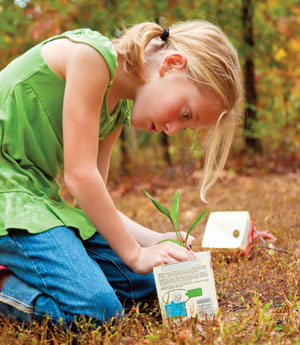Evergreen Packaging, Kidsgardening.org Launch School Gardening Competition
![]() Print this Article | Send to Colleague
Print this Article | Send to Colleague
 Evergreen Packaging, Memphis, Tenn., USA, with support from KidsGardening.org, this week launched Carton 2 Garden, a nation-wide competition that gives students a hands-on experience in repurposing empty cartons to build or enhance their school garden.
Evergreen Packaging, Memphis, Tenn., USA, with support from KidsGardening.org, this week launched Carton 2 Garden, a nation-wide competition that gives students a hands-on experience in repurposing empty cartons to build or enhance their school garden."Partnering with KidsGardening.org as our gardening expert allows us to encourage students to learn about gardens as a means to promote healthy diets, while also teaching them the importance of eco-friendly packaging," said Katie Lewis, marketing manager at Evergreen Packaging. "Students can use recycled cartons from home and school, which also reinforces eco-friendly practices."
Schools from across the U.S. can compete to win prize packages, valued at up to $2,500, by repurposing their empty milk and juice cartons in their school gardens, which will be judged based on creativity and sustainability. Four national winners and 16 regional winners will be chosen. The deadline for submissions is April 22, 2015. The contest promotes good nutritional habits among school children while also emphasizing the positive environmental impact of sustainable packaging. More information and official contest rules are available online.
"Incorporating milk cartons into school gardens not only equips students with an economical and easy-to-come-by resource for improving their gardens, but also gives them a valuable lesson in reusing and recycling," said Jennifer Tedeschi, COO at KidsGardening.org. "The partnership with Evergreen Packaging was a natural fit, and we look forward to seeing how students creatively use cartons in their garden projects."
This initiative underscores Evergreen Packaging's on-going commitment to raise awareness about the importance of eco-friendly packaging. More than 70% of every carton is made from paper, which comes from a renewable resource—trees. Additionally, cartons protect the product inside from UV rays to help keep contents fresh, and are recyclable for more than 50% of households across the country, where facilities exist.


